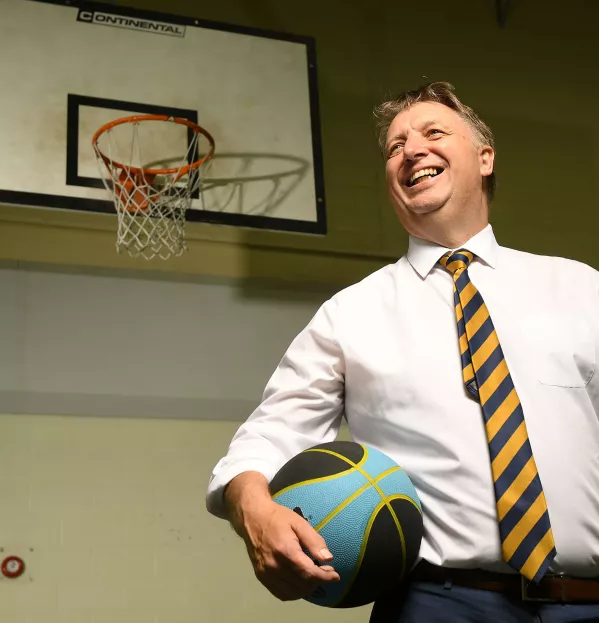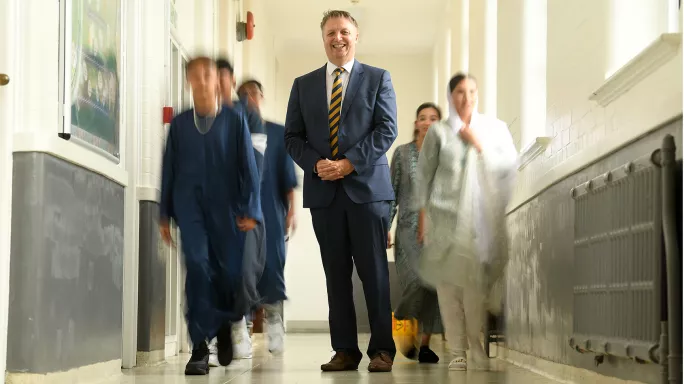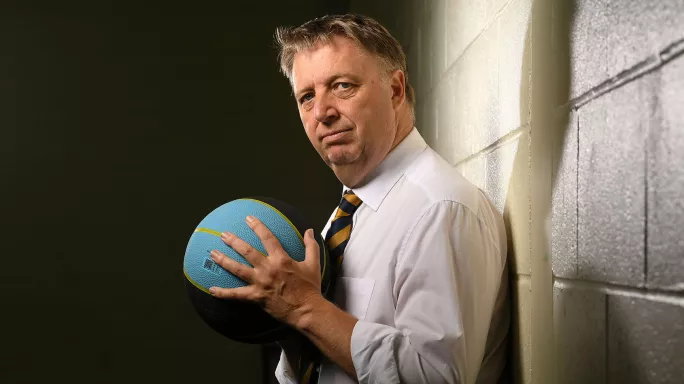
10 questions with...Adrian Rogers

Former PE teacher and headteacher Adrian Rogers is the chief executive officer of Chiltern Learning Trust, which is based in Bedfordshire and runs 16 academies.
Taking part in Tes’ 10 questions series, Rogers talks about the difficulties he faced as a bright boy in a tough school, his inspiration for working in education, transforming struggling schools and the need to change the public perception of teaching as a career.
1. Who was your most memorable teacher and why?
In primary it would be Mr Curtain, who had just come over from Ireland. It was Year 5 and the first time I’d had a male teacher. He was a lovely man; he was kind, and he had that positive masculinity that we talk about nowadays - he was 40 years before his time. He was a very good football player, and he cared deeply about reading and maths. And that version of masculinity was very different to what I’d seen in a working-class community.
It was similar with my PE teacher at secondary school, Mr McAlpine, who died last year, unfortunately. He was a big, tough rugby player but again, he…was very caring and he wanted people to achieve well. Both schools were very low socio-economically, and were very tough schools, so having that version of masculinity that didn’t involve being aggressive, and didn’t involve violence or alcohol, it was quite different.
2. What were the best and worst things about your time at school?
The best things: I really enjoyed all sports and all PE. While I trained as a PE teacher, I used to love maths. I had a really strict [maths] teacher at secondary school, but you knew that he cared so deeply about you, and you’d never let him down. I loved school until probably Year 10.
The worst things: I’d already sat the 11-plus, and assumed until about March that I was going to grammar school. And then we didn’t - we all went into a comprehensive [due to the 1976 Education Act, which banned schools from selecting pupils on ability]. But all they did was set students according to whether they would’ve gone to a grammar or not.
My worst time was undoubtedly when they decided to fully implement mixed ability, in what you would now call Year 10. While I had been in a very tough school, I had been in a top set, sheltered in terms of behaviour.
And then suddenly, in Year 10, we were in mixed ability for everything. I found that quite intimidating, if I’m honest. There was very much an anti-school, anti-work culture. Because I was intelligent - you suffered in those times - it would have been violent/homophobic abuse, so the peer pressure to not achieve massively outshone the sense of wanting to do well.
So Year 10 and Year 11 were not good times. In form time, I ended up doing the maths homework for the children who were in a much lower set than me, because someone has got a chain in his hand, saying, “Rogers, you do the homework or you get this.”
I countered that by just getting into music and sport even more, and I can remember my Dad telling me off for not doing my homework because I was following The Jam across the country.
3. Why do you work in education?
I was the first person in my family not to go down the pit. I was fortunate in that I was blessed with a certain level of intelligence, and that got me out of that rut and gave me opportunities.

And I think that that’s probably what still drives me: you want children to have a better opportunity than you had, to make the schools that we run a better place for the children, to give them those wider opportunities. While I have worked in some affluent areas, I think I probably prefer working in areas similar to where I was as a child, which was a mining community, and raising aspirations.
4. What are you proudest of in your career?
The first thing that brought a tear to my eye was while I was headteacher of a middle school in Bedfordshire and we won the national athletics final in 2009. We competed against all the large, brilliantly athletic schools, and against the private schools. Because I started out as a PE teacher, and athletics was my thing at school, seeing that happen was really special.
More 10 questions...
- Benedick Ashmore-Short, CEO of The Park Academies Trust
- Jude Lowson, headmistress of The King’s School in Canterbury
- Sir Peter Lampl, founder of the Sutton Trust
Also, in my first ever executive headship in 2005, I went to a school where one-third of the children had been on temporary exclusions the term before. I was sent in because I was probably the loudest teacher in that county. And we turned it around. Two years later, it came top of the league table results, from being in absolute meltdown.
The third one was, we took on a girls’ school that had been “requires improvement” for about 20 years, and there were some really fundamental issues. Within 18 months, they got an “outstanding” [Ofsted] report. The perception in the community changed, and the school went from one where parents weren’t comfortable coming through the door, to one that was truly embracing of the community.
5. And what do you regret?
Nothing.
6. What are the best aspects of our school system?
The focus on teaching and learning and great classroom practice, I think, has really come on in the 32 years that I’ve done the job.
7. And what about the worst?
The thing that saddens me the most is the public perception of teaching as a career. It’s a wonderful career. It ought to be a wonderful job, and we’re doing our best to decry that. And that really saddens me. I think there are a few factors: I think Ofsted is more unpopular than it’s ever been by a long long way… there’s very high-stakes accountability. The lack of funding in schools, for both wages and for education resources, I think, has had an impact.

I do think that how we measure our children through GCSEs and A levels is perhaps out of date now. The developments in AI have been incredible…students need to be taught how to use AI sensibly. I don’t think sitting 20 test papers for GCSEs will be relevant in the next five or 10 years.
8. If you became education secretary tomorrow, what would be the first thing you would do?
A review of our testing system, major overhaul of Ofsted and better funding for students.
9. Who has made the biggest difference in education in the past 12 months?
Over the past three years, if I can extend it, Alison Peacock [chief executive of the Chartered College of Teaching]. I knew Alison from when we were national leaders of education (NLEs) together 13 years ago, and I think her unrelenting optimism has been a real credit to the profession - she deserves a lot of plaudits for that positivity. I thought how she helped us through Covid and just beyond was super.
10. Your own teachers aside, who in education has influenced you the most?
Steve Munby, the former head of the National College for School Leadership. I’ve watched him talk with passion and intellect about the profession and about leadership. I’d just got my first “outstanding” [Ofsted grade] and was pushed on to the NLE programme, when I met Steve. And he came and visited my schools and he showed me intelligence about leadership and being able to articulate compassionate leadership.
Adrian Rogers was speaking with Charlotte Santry
You need a Tes subscription to read this article
Subscribe now to read this article and get other subscriber-only content:
- Unlimited access to all Tes magazine content
- Exclusive subscriber-only stories
- Award-winning email newsletters
- Unlimited access to all Tes magazine content
- Exclusive subscriber-only stories
- Award-winning email newsletters
You need a subscription to read this article
Subscribe now to read this article and get other subscriber-only content, including:
- Unlimited access to all Tes magazine content
- Exclusive subscriber-only stories
- Award-winning email newsletters
- Unlimited access to all Tes magazine content
- Exclusive subscriber-only stories
- Award-winning email newsletters
topics in this article



